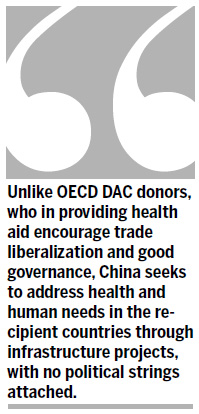Op-Ed Contributors
Contributing to global health
Updated: 2011-03-17 08:01
By Yanzhong Huang (China Daily)
|
|
China should promote dialogue and cooperation with other donors for world health causes to dispel misunderstandings
As China becomes one of the largest economies in the world, it is facing a crescendo of calls to significantly increase its contribution to global health aid.
Critics claim that China, a country with the largest foreign exchange reserve and the second largest fiscal revenue in the world, is still aggressively seeking health aid, even though it makes only a nominal contribution to multilateral financial institutions such as the Global Fund to Fight AIDS, Tuberculosis and Malaria (GFATM).
Contending that there are needier countries, including those in sub-Saharan Africa, that require the benefits China accrues from global health grants, they call for the international community to press China to make the full transition from a health-aid recipient to a global health donor.
Should China contribute more to global health financing as it becomes richer?
Yes, as long as China continues its development. Doing so would benefit global health governance as well as China's international image.
Is China a passive global health donor as critics presume?
No. A closer look at China's engagement in international health and development assistance suggests that it is far more generous than its critics suggest.
It might be hard to believe, but China's acceptance of foreign aid did not become routine until the 1980s and in contrast to its refusal to receive foreign aid, China was a big donor to the Third World. Even during the Great Leap Forward period (1958-1961), when millions of Chinese were starving and dying in the worst famine in modern history, China was still sending money and food to Albania and other countries. China's development assistance as a percentage of fiscal spending peaked in 1973, reaching an eye-popping 7.2 percent, which was higher than that of the wealthiest nations.
However, the growing burden of foreign aid and the squandering of the aid by recipient countries eventually led to a reassessment of China's aid policy. Chinese leaders learned that the amount of foreign aid should match China's development level and status, and that there were limits to utilizing foreign aid as a foreign policy instrument. As a result, the 1970s saw a significant decline in foreign aid as a percentage of fiscal spending.
E-paper

City of Joy
Welcome to the 'world of smiles' where life meanders slowly.
Preview of the coming issue
Debate on nuclear power revived
The future is now
Specials

Beloved polar bear died
Berlin's beloved polar bear Knut, an international star died Saturday.

Panic buying of salt
Worried Chinese shoppers stripped stores of salt on radiation fears.

'Super moon'
The "Super Moon" arrives at its closest point to the Earth in 2011.

